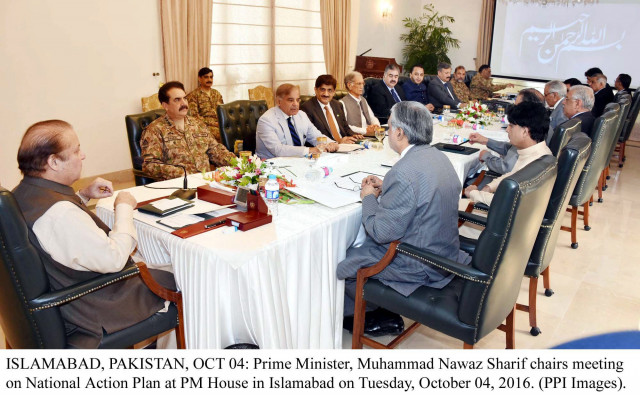Top leaders eye swift NAP implementation
Agree to overcome counterterror shortcomings

The prime minister spoke high of the security forces’ sacrifices in fight against terrorism. PHOTO: PPI
Significant decisions were taken at the top-level huddle presided over by Prime Minister Nawaz Sharif and attended by the five chief ministers, federal ministers, Khyber-Pakhtunkhwa governor, army chief, top military and civilian spymasters, and others senior officials.
Sources privy to developments told The Express Tribune that the prime minister decided to invite chief ministers, security establishment and federal government functionaries after the NAP Implementation Committee advised him to address the concerns of the provinces, without which, complete and effective implementation of NAP was not possible. “A broader view has been taken to enhance the patterns of interaction to ensure that the part of NAP implementation that lies with the provinces does not go unattended,” said a senior government functionary, requesting anonymity.

During the meeting, the sources said, the chief ministers of K-P and Sindh shared their reservations regarding operational and financial issues being faced in the action plan’s implementation in their provinces. Sources said K-P Chief Minister Pervaiz Khattak raised the issue of lack of funding to the provincial law enforcement apparatus on part of the centre. “We are doing our best to manage the affairs while relying on our own resources. But the funds payable by the federal government in support of counterterrorism drive often get stopped or delayed. It takes ages for our files to get approvals (from federal authorities),” informed insiders quoted the Khattak as telling the meeting. “K-P is worst effected by terrorism. It is expected of us to do wonders but without any support. These concerns should be addressed to get the expected results. ”
The K-P chief minister also demanded the deployment of Frontier Corps (FC) at the border demarcating K-P from the Federally Administered Tribal Areas (Fata) to stop unchecked movement of people due to security sensitivities, the sources said.
Sindh Chief Minister Murad Ali Shah is also said to have raised issues regarding funds allocation and certain operational matters concerning the security forces targeted operation in Karachi.
In response, the prime minister is said to have assured the provincial functionaries that their due concerns would be addressed and regular meet-ups would be held in this connection.
An official statement from the PM’s House also contained an implied hint about issues involving provinces in NAP. “It was agreed that collective efforts at the national level and specific efforts at provincial level are required to consolidate the gains made so far and move further in certain areas where progress has been unsatisfactory.”
NSA Nasser Janjua, in his briefing, also stressed that the “role of provincial governments in implementation of NAP was crucial and it was imperative for all of us work with missionary zeal. The meeting agreed on the future course of action in terms of milestones and timelines for different components of NAP.”
The prime minister spoke high of the security forces’ sacrifices in fight against terrorism. “The unwavering resolve of the nation and countless and continued sacrifices by security forces and LEAs have resulted in significant and visible improvement in security situation across the length and breadth of the motherland. National Action Plan is an outcome of the broad-based consensus among all stakeholders,” he said
Published in The Express Tribune, October 5th, 2016.



1725254039-0/Untitled-design-(24)1725254039-0-208x130.webp)















COMMENTS
Comments are moderated and generally will be posted if they are on-topic and not abusive.
For more information, please see our Comments FAQ